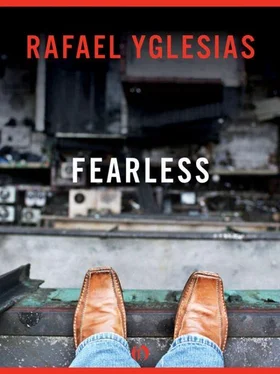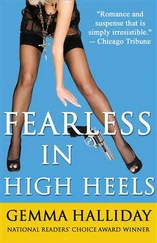What is their problem? Why don’t they shut up and leave me alone?
The drug untied her muscles. Soon they were warm and caressed. Her head, she realized, must have been squeezed by a headache before, because now she felt there was blue sky up there, plenty of space without pain.
Manny hustled to put away the cot the minute the nurse left. He was afraid of her. Manny would sooner chase a crack dealer from the corner than argue with a nurse or a city bureaucrat. She watched her husband strip the cot, fold it and the sheets, and stack them neatly with anxious speed. He could be a marine hurrying to get ready for inspection.
“They were very nice to get me this,” he said about the cot when he was all done. He sat on the chair admiring his neat pile of bedding. “Against hospital rules,” he nodded at her.
She was about to mock his gratitude when she was stopped by a good look at his eyes. His smoky skin, alloyed from his olive Italian father and coffee Filipino mother, was especially dark under his brown eyes. The shadowing lent them a romantic aura. But that morning the skin was blackened by fatigue and grief; it looked almost charred. His eyes were wasted in their burnt setting.
“I got something to tell you,” Manny said. His legs were spread, elbows on his knees, his head braced by his hands. He looked at the floor. “A guy from the airline came by while you were sleeping.”
“They found him?” she was able to ask without any trouble. It surprised her. Hearing herself, she thought she sounded bored.
“They can’t identi—” Manny lowered his head and took a deep breath. He started again, breathing fast: “They can’t be sure it’s his body—” He had to stop. His chest heaved with anxiety. He looked away and mumbled, “Oh God…” He pressed his lips and swallowed. Then he spoke fast: “They’re sending for his hospital records. They’re going to use his footprint.” Again he stopped.
She remembered. When Bubble was born they took a footprint. So part of him had survived. Her baby’s foot.
“They don’t think there’s any reason for us to look at—” Manny covered his mouth with his hand and breathed noisily through his nose.
Not enough left for her to recognize. The image of her beautiful boy being torn apart came into her head without mercy. Manny rushed to hug her, but she looked past him at the ghastly visions of Bubble killed. “I — want — to — go home!” she gasped between her sobs. “Get — me — out of here!”
“We have to wait, honey,” he whispered. “We’ll go soon.”
The nurse poked her head in. “She want a sedative?” she asked Manny, as if Carla weren’t competent to answer for herself.
“No!” Carla shouted. She shook her head vehemently to prove she meant it. “No more drugs!”
“Relax you,” the nurse said.
Carla grabbed Manny’s short-sleeved shirt by its cuffs and yanked. “Leave — me — alone!” she choked the words out.
“Shhh!” Manny pressed her head against his chest. He wasn’t only comforting her; he was worried about her rudeness to the nurse.
The nurse didn’t care. “You sure?” she asked Carla. “I’ll get somebody…” she said and rushed away.
Carla concentrated on the look of Manny’s arm. It appeared smooth and soft, but to the touch the muscles were defined and hard. You might think he spent all day weight-lifting rather than fixing leaky pipes, replacing hallway lights, and rewiring intercoms. She stroked the bulge of his forearm, brushing its few hairs. He had lots of thick hair on top of his head and little elsewhere. He was a bastard, the product of his father’s weekend leaves while stationed in the Philippines. Carla assumed Manny’s mother must have been a whore, but he never said so, and he punched a friend who once suggested it. As soon as his mother died Manny made the trip to the States. He was still a teenager when he came to Little Italy to find his long-lost biological father, retired from the service and then the superintendent of a row of tenements on Broome Street. The meeting was a disappointment for both men. At least Manny did get a job out of it. Through a friend of his unacknowledged pop Manny was made assistant porter in a Greenwich Village apartment building, which meant he got all the shit work, running the service elevator, collecting the garbage from each floor and mopping the halls. Once a month he polished all the brass doorknobs. Manny didn’t like the hours or the work, but he liked New York, its ethnic and racial stew, and its promise of doing better. He took the abuse of the doormen and befriended the handyman, who gave him books so he could teach himself about carpentry, plumbing, electricity and compressors and all the gadgets that people use but don’t know how to fix. Eventually, the super was fired, the handyman was promoted and he elevated Manny as well. Manny was the handyman now, and the heir apparent to the superintendent. “You know what that means,” Manny liked to crow to Carla about his vision of their future. “That means someday you get a fancy Manhattan address.” She admired his ambition and willingness to work hard, his belief in the American dream; but she wished he wasn’t so willing to accept insults and pretend thankfulness.
After she had stopped crying, after her breathing had slowed down, and after she had been quiet for a while, Manny said softly, “I called your mother while you were sleeping. She says it’s all her fault.”
She nodded, not to agree, just to show she had expected that. Her mother was being literal: Carla and Bubble had gotten on the plane to visit her and her husband in their new home. Carla sighed for an answer. She thought, my mother is crazy.
“She wanted to come here. I told her that was crazy.”
“Good,” Carla mumbled. She missed her mother and didn’t want to see her.
“She said she’s going to New York. She’ll be there when we get back.”
The whole family would gather. They would fill the house with black clothes and food and tears.
She shivered. Manny rubbed her arms. Her mouth was dry and tasted bad. “I need a toothbrush.”
“Okay,” Manny said. But he didn’t move, didn’t get out of her arms.
The door opened and Bea Rosenfeld looked in. Carla noticed the glasses first, the big square frames sailing on her nose and two glistening jewels at the corners. She remembered that she had spoken to this woman, but not where or when or about what. For a moment Carla thought that Bea was also a passenger and that they had talked on the runway.
“Hi, I’m Bea Rosenfeld,” She said to Manny. “How are you doing?” she asked Carla.
Carla nodded.
“I heard the news about your son. I’m very sorry.”
Manny’s arms got tight, the hard muscles bulging out from the smooth skin. And he held his breath, as if waiting for something terrible to happen. What was his problem?
“I also heard from the nurse that you didn’t want any tranquilizers. I told her I thought you were right. Throwing blankets on a fire may put it out, but covering feelings only makes them burn inside.”
Carla thought Bea was interesting. She remembered they had met in the emergency room. But she felt no need to answer.
Manny took a breath and shifted. Carla slid off him and reached for the pillow. She had to hang on to something. Manny said: “We don’t know for sure. They’re sending for his records to check the footprints.”
“Oh…” Bea’s tone was hesitant for the first time. “I see. Did they tell you how long that would take?”
“They said it wouldn’t take long. They send it through a fax machine. You know?”
They could be talking about anything .
“Who are you?” Carla asked Bea.
Bea smiled at her, as if she were an intelligent child. “You mean what’s my job?”
Читать дальше












